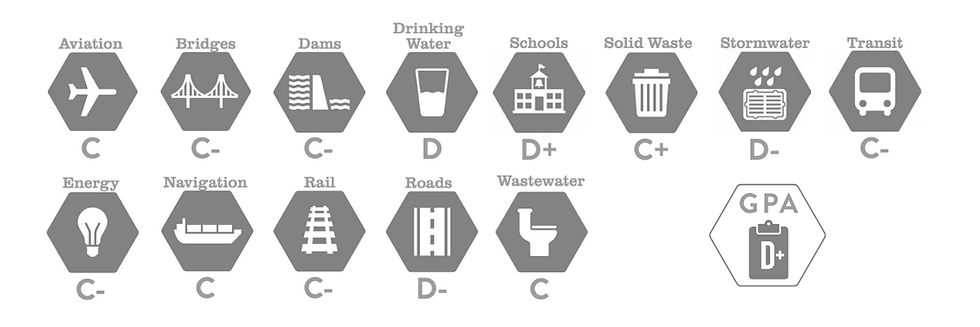The improvements will be the most significant single infusion into our country’s infrastructure in over a decade.
ISHPEMING, Mich. ━ As the $1.2 trillion bipartisan infrastructure package travels through Congress with bipartisan support, Dr. Bob Lorinser, a candidate for US Congress in Michigan’s First District, says Northern Michigan must focus on what the investment can do for the area. Dr. Lorinser says the federal funding will be the most significant single infusion into our country’s infrastructure in over a decade.
“This investment is desperately needed,” said Dr. Lorinser. “This bill creates family-sustaining jobs, advances careers, and will help small businesses grow. It upgrades crumbling infrastructure. The bipartisan agreement ━ which my opponent opposed ━ will ignite the economy and put money in working families’ pockets and food on the table, all without raising taxes.”
The most recent report card on Michigan’s Infrastructure by the American Society of Civil Engineers gave the state an overall GPA of D+. Michigan’s civil engineers studied 13 infrastructure categories. Of those 13, nine infrastructure categories are in mediocre condition, and four are in poor condition.
Michigan’s Failing Infrastructure Grades by the ASCE
Dr. Lorinser says this could be a “game-changer” for the First District. “It could help Northern Michigan build a robust energy grid, advance public transportation, provide access to clean drinking water for hundreds of thousands, and start to meet the broadband needs of rural Michiganders, many of whom live in the First District. It’s truly a transformative, historic bipartisan investment.”
A Historic Investment in Michigan:
$7.3 billion for highway repairs for Michigan
$1 billion for environmental protection of the Great Lakes
$563 million for bridge replacement and repairs
$100 million to provide broadband coverage and connect at least 398,000 residents to the Internet
The legislation would provide $65 billion in investment to improve broadband, with at least $100 million directed towards providing broadband coverage to at least 398,000 residents in Michigan. It aims to lower the price of internet services, create price transparency, and help more low-income households access the internet.
Investment in Broadband
“My opponent has been trying to invite broadband expansion to the area since he took office, but he is exclusively concentrating on attracting private corporate investment, and although there’s certainly a role for private enterprise, so far, his efforts have been unsuccessful,” said Dr. Lorinser. “Approximately 1.2 million households, many of whom live in the district, do not have a permanently fixed broadband connection. This is unacceptable.”
Dr. Lorinser says he applauds several organizations, specifically Michigan Broadband Cooperative, Connected Nation Michigan, and Center for Change, which are leading the way in advancing the conversation of broadband access in rural Northern Michigan.
“At a local level, rural broadband can significantly improve our students’ learning,” said Dr. Lorinser. “It can assist our daughters to pursue their passions in STEM programs to become engineers, scientists, and world leaders. It can help our sons realize their dreams of studying international business and communicating around the globe. Access to consistent, reliable broadband will also enable Northern Michigan residents to work from home, which positively transforms our economy and attracts opportunity and investment to the area.”
At a state level, the infrastructure bill would provide $100 million to extend broadband coverage and provide nearly 2.5 million low-income Michigan households the opportunity to apply for funds to help afford internet access, a goal Dr. Lorinser champions.
Investment in Infrastructure
Michigan stands to receive $7.3 billion in federal highway aid and $563 million for bridge replacement and repairs, as well as the opportunity to compete with other states for billions more in bridge and road projects. Dr. Lorinser says investment in our infrastructure is vital as our great state has received poor marks for years for its infrastructure. A report from five years ago stated that much of Michigan’s infrastructure is reaching the end of its useful life.
Jobs – “The bottom line.”
“The way to attract new jobs is to be a place where people can work and live, where healthcare and education are superb, and where we welcome innovation,” said Dr. Lorinser. “Infrastructure improvement will help. Thousands of jobs could result from this project throughout our district for years to come. Unfortunately, the recent Census highlights that the largest population loss by percentage in our state was in the Upper Peninsula. Jobs, population growth, and infrastructure improvement go hand in hand.”
Lorinser commends both sides of the Congressional aisle for achieving compromise. The bill does not represent all that Democrats want, nor everything the Republicans seek. Senator Mitt Romney (R-UT) stated the legislation “provides a once-in-a-generation investment in our country’s physical infrastructure without raising taxes.”
“Whenever I evaluate federal legislation, I’m looking to ensure each community in Northern Michigan is a priority,” said Dr. Lorinser. “Investments in broadband and infrastructure━two primary components of this historic legislation━are investments I support.
“My opponent has mislabeled this legislation and voted no on H.R.3684 – Infrastructure Investment and Jobs Act. Unfortunately, his focus is not on the crucial necessity and positive attributes of the overdue investment. If I were Northern Michigan’s Congressman, I would have voted for this bill because it undoubtedly will help thousands of our citizens economically thrive.”
# # #
About Dr. Bob Lorinser
Dr. Bob Lorinser is running for U.S. Congress in Michigan’s First District.
After Dr. Bob Lorinser received three advanced degrees (Medical Doctor, Masters of Social Work, and Masters in Public Health), he worked as a social worker in a Veteran’s Affairs Hospital and as a resident doctor with the Indian Health Service, serving the Navajo Nation. In 1989, he found his home in Michigan’s First District, where he practiced family medicine for three decades.
Dr. Bob joined the U.S. Department of State’s Foreign Services in 2011 to serve as a diplomat and Regional Medical Officer. The Lorinsers served the United States for ten years, with tours in Pakistan, South Korea, Afghanistan, Morocco, and Iraq.
When he returned to the states in 2020, Dr. Bob offered his services as Medical Director of Marquette County Health Department. For more information, visit VoteDrBob.com.





Comments